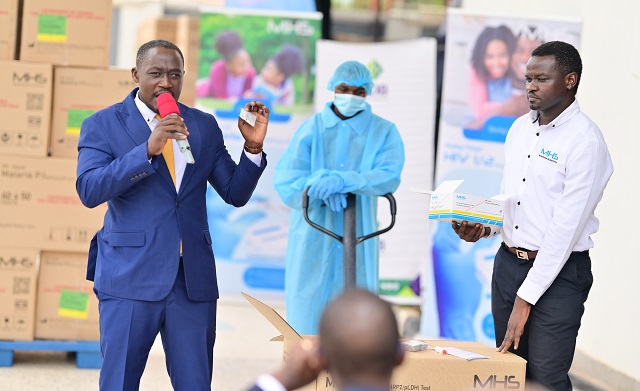
The investment from Uganda Development Bank supported MHS in acquiring capital-intensive equipment and purchase of raw materials.
Kampala, Uganda | THE INDEPENDENT | Microhaem Scientific (MHS), a Ugandan medical supplies company funded by the Uganda Development Bank (UDB), has dispatched its first consignment of locally manufactured diagnostic kits to the Government of Uganda through the National Medical Stores.
MHS produces diagnostic kits that enhance the efficiency, convenience, and accuracy of malaria, HIV, and sickle cell disease diagnoses.
Patricia Ojangole, the Managing Director of Uganda Development Bank, described the event as “a significant milestone” and “a testament to the remarkable potential of Uganda’s innovation and industrial capabilities.” “At UDB, our mission has always been to empower local enterprises, foster sustainable growth, and drive socio- economic transformation through strategic investments. Today, we see the tangible results of that mission come to life. With an investment of $7.5 million allocated for asset financing and the purchase of raw materials, we have not only supported Microhaem Scientific’s journey but also reinforced our belief in the power of homegrown solutions to address critical healthcare challenges,” Ojangole stated at the event held in Ntinda, Kampala, where MHS's production facility is located.
This project aligns with UDB’s mandate and strategic plan to support manufacturing enterprises. It aims to increase the range and scale of products for import substitution, export promotion, and improved trade terms to grow the industrial sector and enhance its contribution to the nation.
Dr. Cedric Akwesigye, the Managing Director of Microhaem Scientific, emphasized that the company is working to reduce reliance on imports by locally manufacturing products that have traditionally been sourced from abroad.
“The advantage of this is that we will not have to wait long for imported products. For instance, the kits we are dispatching today were manufactured on February 2nd, and by February 4th, they will be in a health facility. Previously, an order would mean waiting three months due to shipping,” Akwesigye explained.
He also highlighted the challenges faced by Ugandan manufacturers, particularly the lack of long-term financing.
“UDB has provided crucial support to MHS. The primary assistance was financing, which greatly contributed to establishing our manufacturing plant and purchasing equipment. Additionally, the Bank offered valuable advice,” Akwesigye added. “Financing has always been challenging, especially in Africa where capital is expensive. UDB is a development finance institution that offers affordable credit and is patient with businesses committed to development projects.”
Uganda currently utilizes approximately 30 million malaria tests and 15 million HIV tests annually. Until now, all these Rapid Diagnostic Tests (RDTs) have been imported, and MHS aims to tap into this market. Local supply brings additional benefits, including eliminating shipping costs and improving the efficiency, convenience, and accuracy of malaria, HIV, and sickle cell diagnostics.
“We are better prepared for any emergencies that may arise. Uganda can produce testing kits for its population and the East African region if a pandemic occurs. We are building a center capable of manufacturing for the entire continent,” Akwesigye stated.
MHS is ISO-13485-certified for in vitro diagnostics (IVD) for malaria, HIV, and sickle cell testing. Currently, the company employs 423 permanent and 27 temporary staff, producing 80 million tests annually with the potential to scale up. The firm’s product pipeline also includes monoclonal antibodies and vaccines, among other offerings.
Officials in the health sector celebrated this significant milestone as a crucial step toward improving the supply and efficiency of the country’s healthcare system.
Dr. Daniel Kyabayinze, the Director of Public Health, representing Dr. Diana Atwiine, the Permanent Secretary of the Ministry of Health, praised the government for supporting private enterprises in the healthcare sector.
“The best gift you can give any innovator is a market,” Dr. Kyabayinze remarked, referring to the government’s 10-year offtake guarantee granted to MHS.
“We hold 12 million diagnostics for malaria every year in Uganda, and those are just the ones documented by the government. The market for prompt and accurate diagnostics is significant. The kit manufactured by MHS replaces the need for a microscope, which requires an operator to spend an hour before providing results. With this kit, results can be obtained in just 15 minutes.”
Dr. Kyabayinze emphasized the importance of accurate diagnostics, noting that a wrong positive diagnosis for conditions like hepatitis could lead to a lifelong treatment regimen. In contrast, a wrong negative diagnosis for malaria could be fatal if left untreated.
 The Independent Uganda: You get the Truth we Pay the Price
The Independent Uganda: You get the Truth we Pay the Price



